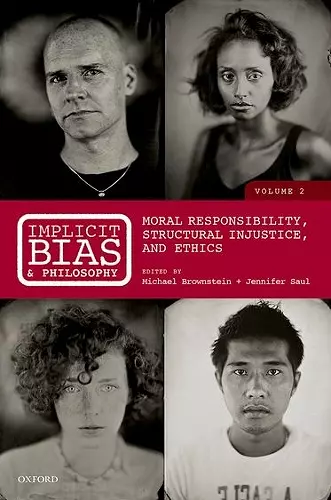Implicit Bias and Philosophy, Volume 2
Moral Responsibility, Structural Injustice, and Ethics
Michael Brownstein editor Jennifer Saul editor
Format:Hardback
Publisher:Oxford University Press
Published:31st Mar '16
Currently unavailable, and unfortunately no date known when it will be back

There is abundant evidence that most people, often in spite of their conscious beliefs, values and attitudes, have implicit biases. 'Implicit bias' is a term of art referring to evaluations of social groups that are largely outside conscious awareness or control. These evaluations are typically thought to involve associations between social groups and concepts or roles like 'violent,' 'lazy,' 'nurturing,' 'assertive,' 'scientist,' and so on. Such associations result at least in part from common stereotypes found in contemporary liberal societies about members of these groups. Implicit Bias and Philosophy brings the work of leading philosophers and psychologists together to explore core areas of psychological research on implicit (or unconscious) bias, as well as the ramifications of implicit bias for core areas of philosophy. Volume 2: Moral Responsibility, Structural Injustice, and Ethics is comprised of three sections. 'Moral Responsibility for Implicit Bias' contains chapters examining the relationship of implicit biases to concepts that are central to moral responsibility, including control, awareness, reasons-responsiveness, and alienation. The chapters in the second section--'Structural Injustice'--explore the connections between the implicit biases held by individuals and the structural injustices of the societies in which they are situated. And finally, the third section--'The Ethics of Implicit Bias: Theory and Practice'--contains chapters examining strategies for implicit attitude change, the ramifications of research on implicit bias for philosophers working in ethics, and suggestions for combatting implicit biases in the fields of philosophy and law. This volume can be read independently of, or in conjunction with, Volume I: Metaphysics and Epistemology, which addresses key metaphysical and epistemological questions on implicit bias, including the effect of implicit bias on scientific research, gender stereotypes in philosophy, and the role of heuristics in biased reasoning.
Overall, Implicit Bias and Philosophy, volume 2: Moral Responsibility, Structural Injustice, and Ethics is comprehensive, insightful, and often innovative. It is required reading for all philosophers working on implicit bias, and all psychologists interested in the theoretical implications of psychological research on implicit bias. Philosophers working on moral responsibility might be interested in the diversity of approaches to responsibility stimulated by implicit bias research. As the issues discussed in the book have important practical implications, they should be of interest to a non-academic audience, including policymakers. * Katherine Puddifoot, Hypatia: A Journal of Feminist Philosophy *
The volume is an invaluable resource for understanding the link between moral philosophy and implicit bias--especially as it concerns moral responsibility. A review cannot do justice to the painstaking attention that nearly all the authors devote to empirical research in this area. * Jeffrey A. Gauthier, Notre Dame Philosophical Reviews *
ISBN: 9780198766179
Dimensions: 234mm x 166mm x 21mm
Weight: 580g
296 pages